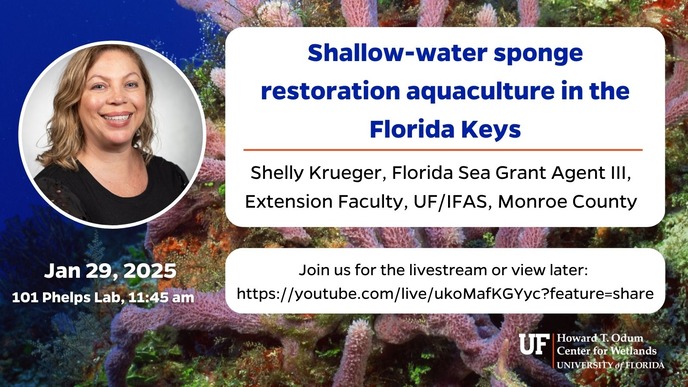
Shelly Krueger, Florida Sea Grant Agent III, Extension faculty at the University of Florida Institute of Food and Agricultural Sciences (UF/IFAS), Monroe County
Join us for the livestream January 29, 11:45am ET: https://youtube.com/live/ukoMafKGYyc?feature=share
(Please visit our YouTube channel main page for the stream if there are any issues with the direct link.)
ABSTRACT
Serial sponge die-offs in Florida Bay and elsewhere have drastically reduced adult sponge standing stock biomass. Restoration aquaculture of sponges can help alleviate the long-term ecological damage in wetlands caused by these die-offs. Restoration aquaculture is the cultivation of plants and animals to increase declining wild populations and improve the health of coastal ecosystems (FAC§18-21.003). Sponge restoration aquaculture can help restore water quality, biodiversity, and support essential fish habitat for other economically important species. Sponges are essential for healthy ecosystems because they continuously filter large volumes of water while feeding on phytoplankton, viruses, and bacteria. Sponges also transform water chemistry by cycling nutrients. As part of my PhD research, we quantified the role of three sponge species in modulating water quality by measuring net N2 fluxes (balance between denitrification and nitrogen fixation), oxygen respiration, and inorganic nitrogen fluxes. Our results reinforce previous findings that sponges, and their associated microbial community, are essential to the productivity and nutrient cycling in tropical ecosystems. From a restoration standpoint, since stochastic events such as hurricanes and algal blooms are ongoing, it is important to know at what point sponges restored for population enhancement become reproductive to gauge recruitment competency. Therefore, we surveyed the reproductive viability of outplanted sponges at Florida Fish and Wildlife Conservation Commission (FWC)-permitted nurseries to discern when spawning occurs following restoration, which can also serve as a proxy for potential larval recruitment. Using histology and light microscopy, we evaluated 6 sponge species for gametogenesis 3-6 years following in-situ asexual aquaculture propagation. Preliminary results revealed gametogenesis in 93% of the sampled sponge propagules. These studies were performed in collaboration with the FWC in support of the current state of Florida restoration and management efforts.
BIO
Shelly Krueger is Extension faculty at the University of Florida and the Florida Sea Grant agent in the Florida Keys since 2013. Florida Sea Grant is a UF-based program that supports research, education and extension to conserve coastal resources and enhance economic opportunities for the people of Florida. Shelly has a BS from Georgia Tech and a MS from Savannah State University in marine science. Shelly is also a PhD student at UF School of Forest, Fisheries, and Geomatics Sciences in Fisheries and Aquatic Sciences, majoring in sponge restoration aquaculture. In 2019, Shelly wrote the Sponge Restoration module for the UF/IFAS Florida Master Naturalist Program special topics course Marine Habitat Restoration. As an UF/IFAS Extension agent, Shelly Krueger provides science-based education for Florida’s coast on a broad range of topics including sponge ecology, water quality, Sargassum, and stony coral tissue loss disease.
POSTCARD
